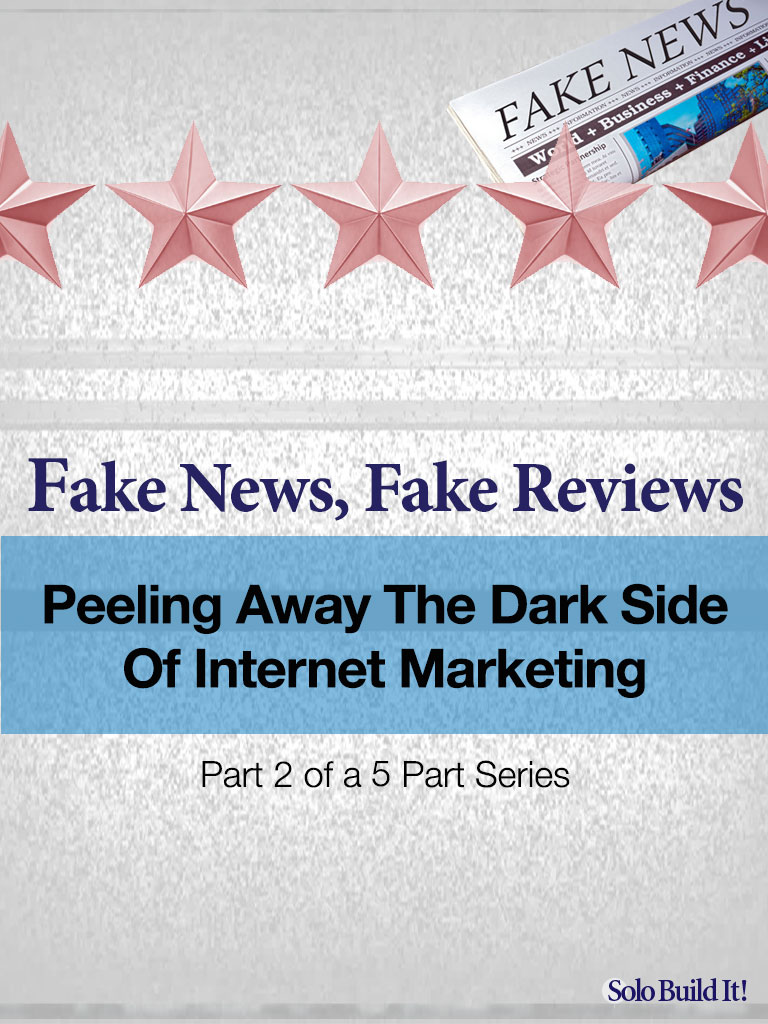
The 5 Parts: Fake Reviews
Part 1: What is a Fake Review, and Why Should You Care? (You are here)
Part 2: Peeling Away The Dark Side Of Internet Marketing
Part 3: Spot ’em and Stop ’em!
Part 4: Tired of Fake Reviews? Let’s Steer a Different Path!
Part 5: Beat the Fake – How to Gather Authentic Reviews for Your Business
You’re going to thank me for this article, in more ways than one. Because I’m here to tell you about the one kitchen tool you never knew you needed — until now.
The Hutzler 571 banana slicer. Here it is, along with one of its many reviews…
 “For decades I have been trying to come up with an ideal way to slice a banana. “Use a knife!” they say. Well…my parole officer won’t allow me to be around knives. “Shoot it with a gun!” Background check…HELLO!
“For decades I have been trying to come up with an ideal way to slice a banana. “Use a knife!” they say. Well…my parole officer won’t allow me to be around knives. “Shoot it with a gun!” Background check…HELLO!
I had to resort to carefully attempt to slice those bananas with my bare hands. 99.9% of the time, I would get so frustrated that I just ended up squishing the fruit in my hands and throwing it against the wall in anger.
Then, after a fit of banana-induced rage, my parole officer introduced me to this kitchen marvel and my life was changed.
No longer consumed by seething anger and animosity towards thick-skinned yellow fruit, I was able to concentrate on my love of theatre and am writing a musical play about two lovers from rival gangs that just try to make it in the world.”
Funny?
Of course. It’s a little light entertainment in a world that often needs it.
Fake?
Of course. It’s one of the many tongue-in-cheek Amazon reviews of products which are deemed to be so useless as to be crying out for it.
Fake reviews for banana slicers and their ilk can be accepted for what they are – comedic. They’re obviously “fake,” and no one takes them seriously.
But generally, reviews tell us what to read next, where to eat dinner (and what to order), where to go on vacation, which doctor to call. Soon, as Google demonstrated with the introduction of its voice-activated Google Home device in May, reviews will be read aloud to you as you lie on the couch, wondering which movie to see next.
Reviews, in short, are a critical and integral part of modern life. They’re even more crucial to the younger age group than the older, so as time goes on their importance will only increase.
For Millennials it’s even higher: 77% of those aged 18 to 29 are more likely to purchase via mobile if the site or app has reviews.”
Source: The Power of Reviews
So when reviews, particularly those that have the potential to alter people’s lives, are not just misleading but plain dishonest, the ripples can be immense.
The faking of reviews, both positive and negative, is a serious issue. At the core of the problem is the fact that there are huge benefits to behaving unethically, but very little cost for those caught doing so.Suw Charman-Anderson in Forbes: Fake Reviews – Amazon’s Rotten Core
Let’s roll this back a little.
What Is a Fake Review?
In the first article of this series, “What Is a Fake Review, and Why Should You Care?” we examined the different types of fake reviews. There’s no better summary of what constitutes a fake review than this one by the European Parliamentary Research Service:
The problem is far more serious and widespread than a fake-funny Amazon review, or a fake restaurant review.
Why?
First, because there’s evidence(1) that £23 billion — that’s $30 billion at today’s rate of exchange — is being wasted each year due to untrustworthy website reviews.
That’s $30 billion of our money — folks who rely on reviews for everything from books to hotels to the latest in top-of-the-range cars. Wasted because we’re being duped by fake reviews.
And second, because it’s not all about the instant financial. Picking the wrong product carries significant opportunity cost. And the fallout from that — including, in the long-term, income — can be far more significant.
And, sadly for our industry, nowhere is the situation worse than in the world of internet marketing.
Internet Marketing: The Dark Side of Affiliate Marketing?
Twenty years ago, when we started our own affiliate program, affiliates generally recommended what they truly thought was best. They were happy to earn income while providing a valuable service for their readers. WIN-WIN.
Many companies in the online business / internet marketing industry (including SiteSell) still offer an affiliate program to help promote their product or service. As an affiliate, you get a commission if one of your readers clicks the link to the recommended product and then purchases it.
That’s not a problem — as long as the reviews are honest.
And therein lies the issue.
We’re all aware of Consumer Reports (or “Which?” in the U.K.). On the Consumer Reports (CR) “About Us” page they say:
“For 80 years, we have provided evidence-based product testing and ratings, rigorous research, hard-hitting investigative journalism, public education, and steadfast policy action on behalf of consumers’ interests.
Unconstrained by advertising or other commercial influences, we have exposed landmark public health and safety issues and have strived to be a catalyst for pro-consumer changes in the marketplace.
Our Mission Is Driven By:
- A team of trusted experts who put thousands of products to the test each year in our 50 state-of-the-art labs and 327-acre automobile testing track.
- Advocates and policy experts in offices across the country who engage with more than 1 million consumer activists to push for improvements in the marketplace.
- A digital team developing new channels to better listen to and amplify the concerns of everyday consumers.
- Venerated CR surveys—second in size only to the U.S. census—capturing feedback on purchasing decisions, experiences, and shopping habits, helping us further our work to inform and protect.”
Venerated in pre-Internet days, it remains a gold standard of how to review a product. It is, in short, rigorous, fair and trusted.
But it’s not free. Even though it costs only $35 per year (and no, I’m not an affiliate ), we have become used to “free” online. So reputable is sidelined in favor of costless.
“Free,” though, does have a cost. It takes time (and therefore money) to create outstanding content that delivers everything the consumer wants to know. It takes time to create a truly honest review — one based on the reviewer’s trial of the product, a thorough evaluation, an impartial assessment of quality and a thoughtfully written, well balanced article.
Reviews are at their most potentially profitable, of course, at the point where you’re closest to making a purchase. The most obvious point of intersection between you, the ready-to-buy consumer, and the reviewer is when you are searching for product reviews, ready to click on an affiliate link.
All of which has given rise to a much darker side of affiliate marketing. A side that sees the importance of making a quick buck take the place of time-consuming, meticulous reviews. Where giving the potential customer a great experience that matches her need is overtaken by greed.
With the rise of their commercial importance, with more and more people relying on reviews before they buy, we have witnessed a surge in dishonest, often blatantly fake, reviews. They are especially endemic in the “make money” / “online business” arena, where it has become impossible not to find fake reviews when researching any product.
What’s Real, What’s Fake?
We looked at the machinations of some different types of fake reviews in Article 1. Let’s look at one of them — affiliate marketing — in more depth.
1 – Real Affiliate Reviews are valuable when the author knows the niche and the competing products well, enabling him/her to provide deep coverage and comparison.
It’s known that 82% of shoppers specifically seek out negative reviews(3): they want to know everything about the product — warts and all. A real review will point out a product’s weaknesses where they exist as a crucial part of a good quality assessment.
The final conclusion — positives and negatives assessed in a fair and objective way from a basis of personal knowledge and written as an honest, impartial opinion — helps the reader to make the best choice possible.
So far, so straightforward. But…
No remuneration (in any form) should be received by the author from the company that provides the product or service.
If an affiliate relationship exists, that individual review must reveal the relationship, including a statement about payment.
In fact, any remuneration must be revealed. For example, if a camera reviewer receives a camera for review purposes, the reviewer must return it or reveal acceptance of this “gift.”
Such notification is legally and morally critical. The reader, once notified, has a fair chance to assess the review in the light of full disclosure. When a review is of outstanding quality, such disclosure can be to the author’s advantage.
So what’s fake?
Sadly for the marketing industry, many affiliate reviews — written mostly for payment and not out of a passion to deliver outstanding information to the reader — fail to disclose. Notification of relationship and payment is not included because the author is fearful that it will decrease confidence in the review.
The reader incorrectly believes that the review reflects a consumer’s honest and impartial opinion, “without fear or favor.” She has no way of knowing otherwise.
2- “Bait and Switch” Reviews
And then there are “bait and switch” reviews. Any review of a product written in order to sell a different or competing product is fake. Legally, it is misleading advertising.
Here’s an oversimplified offline version:
- Angus sees an ad in a local paper for Scotch at $1 a bottle. Angus likes Scotch! — and he has a keen eye for a bargain.
- So he goes down to the local retailer who ran the ad to claim his bargain bottle.
- “Sorry,” says Ronnie the retailer, “I don’t have any more of that brand in stock. But I do have this brand. That will be $60, please!”
- If Ronnie has advertised the $1 brand knowing he does not have it in stock, he’s guilty of “bait and switch.” His aim is to do whatever it takes ($1 Scotch “bait”) to get people into his store — and sell them a higher priced product ($60 Scotch “switch”).
In the world of internet marketing, if the review of Product A (the “bait”) carries a clear affiliate notice and if Product B (the “switch”) is evidenced to be the superior product, I personally would consider that to be “aggressive marketing.” While it’s sneaky, the referral to Product B (if superior) is still a useful service.
The law, though, does not agree — it’s “misleading advertising.” The reviewer has been deceitful in luring the consumer to sell a product different to the one the consumer was looking for.
But it gets worse.
Under the Guise of Helping, They Hurt
Because when, using the “bait and switch” technique, an affiliate lures you in with a fake review of Product A, and points you to Product B knowing that it’s demonstrably inferior to Product A, that amounts to next-level immorality that, in my opinion, approaches fraud.
Let’s look at an example.
- Mary is a 29 year old woman who’s stuck in a tedious, undemanding job that is stifling her individuality. She’s energetic, motivated, and she has a passion for hiking in Australia.
- She overheard someone at a conference talking about building a successful online business with Solo Build It! (SBI!), and decides to take a look for more information. She does a search, and finds what looks like a review.
- This review talks about SBI! but compares it to a different product — Wealthy Affiliate. The author (who has no direct experience of SBI!, but fails to mention that!) says that SBI! has its good points — but Wealthy Affiliate is better.
- Mary is convinced she’s found a legitimate review of SBI!. She doesn’t realize that she’s actually in a sales funnel for Wealthy Affiliate.
- She’s not stupid though — she knows not to trust one individual review. So she searches for others. And finds similar results.
- The power of the “Wisdom of Crowds” takes over. Persuaded by reviews that she does not realize to be fake, Mary buys Wealthy Affiliate.
- Sadly, Mary has no knowledge of the results of a study that prove conclusively that her chances of success with Wealthy Affiliate are minimal compared to how she could have fared with SBI!.
- Nor did she realize that the person who just sold her on Wealthy Affiliate stands to make a personal financial (affiliate) gain.
There are 2 potential victims of this particularly abhorrent type of fake review…
- the consumer who’s lured into buying an inferior product
- the targeted company, especially when it has the superior product. Its brand is unfairly tarnished. That’s Solo Build It!, as we have proven elsewhere.
This type of review is the worst kind of fake.
 Any scheme that intends to hurt the consumer is odious. And in the general niche of “online business,” this widespread practice casts a pall of credibility over the whole space.
Any scheme that intends to hurt the consumer is odious. And in the general niche of “online business,” this widespread practice casts a pall of credibility over the whole space.
Seemingly written to help (“you may be searching for Product A, but I’m glad you found me because I’m here to tell you you’ll be so much more successful with Product B”), it’s actually written purely to mislead a solopreneur — to make a buck.
- The author knows that he could (and should) be pointing you to a superior product, even if it pays him a lower commission.
- Instead, he chooses to maximize his own income by deliberately leading you to an inferior product.
And unlike the banana slicer, the damage done by this type of fake review is not limited to the cost of the product. A knowingly bad recommendation could…
- cost you years of your life (opportunity cost)
- end in your final surrender to the reality of failure
- result in a feeling of despair and defeat, when success was a realistic alternative.
As champions of solopreneurs and “The Individual Dream” (the updated, digital/global version of “The American Dream”), we find this practice odious.
Those who knowingly write fake reviews to mislead solopreneurs to an inferior product because it makes them money at the expense, potentially, of someone’s livelihood and dreams of a better future, are to be despised.
Not only do they harm people with goals and dreams, and the initial motivation to achieve them…
They diminish us all.
Things Can Only Get… Worse?
Writing fake reviews is lucrative, so I expect the problem to get worse. The prevalence of fake reviews is so high that it has become a serious issue that consumer protection agencies like the “Competition and Markets Authority” in Great Britain are investigating. There are plans to fine companies that use or encourage shady review tactics.
But sadly, fake reviews still dominate the online business space. Affiliates and the companies that train and/or fail to monitor/discipline them are directly to blame. And the whole scheme works because search engines fail to discriminate.
Fake review detection technology is available. “Review aggregators” have addressed the problem aggressively. It’s reasonable to assume that Google would have the sophistication to detect and penalize fake reviews.
However, when you search for “Product A review,” you’re likely to encounter several fake reviews in the “online business” space. It’s so bad in some sub-niches (e.g., “MMO,” “work at home”) that virtually all of the Top 10 on a search engine’s results page can be fake reviews.
We found this to our cost when we discovered the fake SBI! reviews online, which resulted in the whole Study of Wealthy Affiliate vs. SBI!…
The verifiable proof of success on our site, compared to absolutely none on Wealthy Affiliate’s site, nor any by their affiliate “reviews,” should be highly convincing to most people. Still, it’s not an absolute, 100% lock. After all, there could be some inexplicable reason why a company would choose not to do what it does best — show its results, if it has them.
The Study has replaced opinion with fact. Wealthy Affiliate affiliates cannot hide behind “we didn’t know” or “I have a right to my opinion.” Neither is a defense, in any event. However, we have informed every ranking affiliate of Wealthy Affiliate — twice.
Only 1 (that we know of) has pulled down a review. That may seem hard to believe to most people. Most of us are basically honest, good people. We assume the same “of the next guy.”
Sadly, that is not the case, especially not in our niche.
Things Can Only Get… Better!
Fake reviews can lead to people making the wrong decisions and fair-playing businesses losing out.Nisha Arora, Senior Director, UK Competition and Markets Authority
Experiencing life as the “victim” of fake reviews, whether from the company or the individual perspective, is a depressing business.
Depressing for the company because your hard earned reputation, earned over many years, is tarnished by fake reviews and by a product proved to be far less successful.
Depressing for the company, too, knowing that people are being side-tracked into situations that are unlikely ever to give them what they deserve. And knowing that many of those people could do so much better.
Reading — and writing — about fake reviews can be an even more depressing experience. The more you dig, the more you find.
So much negativity. So much disregard for others. So little respect for the potential of individuals, many of whom are in a vulnerable situation.
The only “winner” in all this are the affiliates who lack the moral fiber to play fairly. They lure folks who search for reviews of products into their fake reviews, then mislead them into another.
They are, in effect, stealing potential solopreneurs away from the opportunity they were researching. And potentially, from a fulfilled future.
What to do? Sit back and become more depressed? Sigh and say “Well, that’s the world today for you”?
No.
The pain and suffering inflicted upon individuals as a result translates into a huge “this is all a scam” black eye upon us all.
So…
It’s up to all of us to take responsibility. It’s up to us to cleanse our house. There are action steps possible — some easy, some not.
Whether you’re a potential consumer of e-business products, or a producer / promoter of them, we’ll show you how to help stamp out this practice.
For that, please proceed to the third part of our series.
The 5 Parts: Fake Reviews
Part 1: What is a Fake Review, and Why Should You Care? (You are here)
Part 2: Peeling Away The Dark Side Of Internet Marketing
Part 3: Spot ’em and Stop ’em!
Part 4: Tired of Fake Reviews? Let’s Steer a Different Path!
Part 5: Beat the Fake – How to Gather Authentic Reviews for Your Business

Latest posts by Ken Evoy (CEO, SiteSell) (see all)
- Understanding the 3 Phases of Search: A Guide for Website Owners - April 10, 2025
- Large Language Models: What Content Creators Need to Know - March 13, 2025
- Beyond the Helpful Content Update: The Real Lessons Google Is Teaching Us About the Future of Search - February 19, 2025

